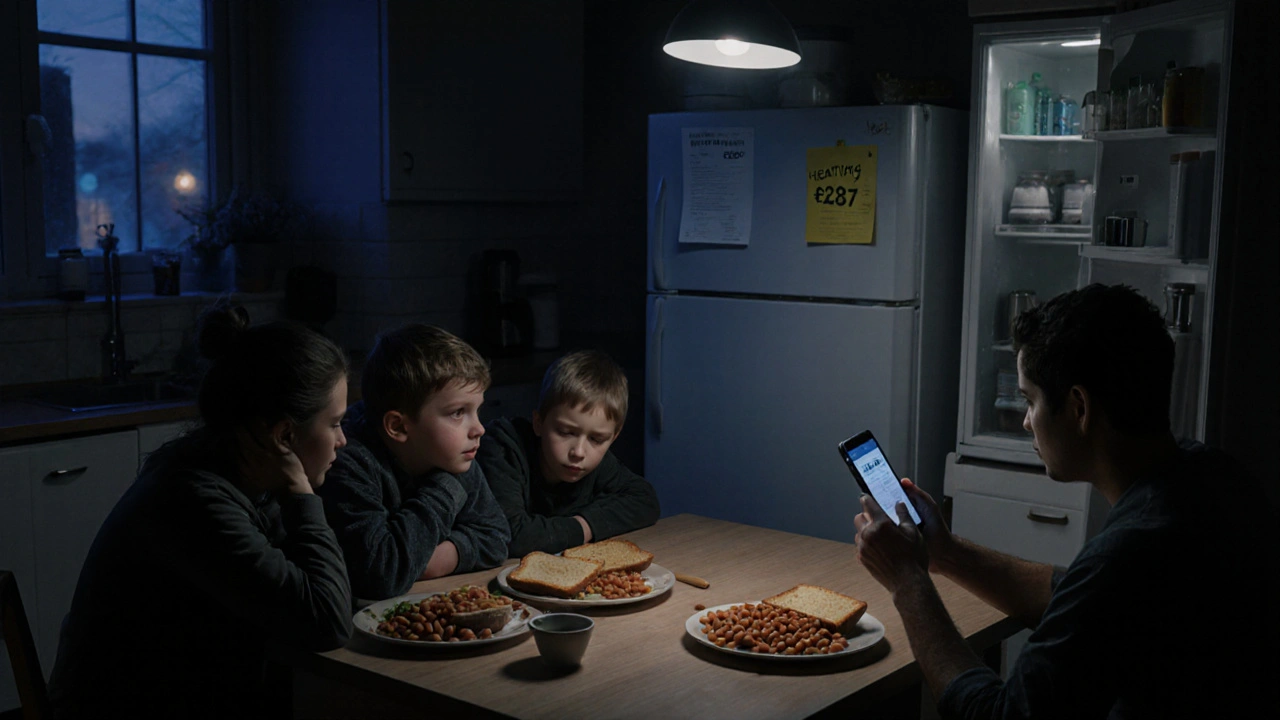Since 2020, the UK has seen a quiet but steady erosion in everyday well-being. People aren’t just complaining about rising bills-they’re skipping meals, delaying medical care, and working multiple jobs just to keep up. The question isn’t whether life feels harder anymore. It’s whether the decline is temporary, or if the UK is settling into a new, lower baseline for quality of life.
Real incomes have fallen for over five years
In 2023, the average UK household earned 6.4% less in real terms than it did in 2019, according to the Office for National Statistics. That’s not inflation. That’s a drop in what money can actually buy. Wages rose, but not fast enough. Meanwhile, food prices climbed 23% between 2021 and 2024. Energy bills, though capped, still cost 40% more than pre-pandemic levels. For a family of four on median income, that’s an extra £3,200 a year just to stay in the same place.
It’s not just about paychecks. The value of benefits hasn’t kept up. Universal Credit increased by 6.7% in April 2024, but inflation for essentials like rent and childcare was over 9%. That gap means millions of low-income households are worse off now than they were before the pandemic.
Healthcare is stretched beyond breaking point
Waiting times for NHS care have hit record levels. In early 2025, over 7.5 million people were on waiting lists for non-emergency treatment-up from 4.5 million in 2019. The average wait for a specialist appointment is now 18 weeks. For mental health services, it’s over 22 weeks in some regions. People aren’t just delayed-they’re deteriorating while they wait.
GP access is worse too. Nearly half of all patients can’t get a same-day appointment. Many now turn to private clinics or online pharmacies just to get basic care. The result? More people are managing chronic conditions without proper oversight, leading to higher hospital admissions down the line.
Housing is no longer a foundation-it’s a trap
Rent in the UK rose 14% between 2022 and 2025. In London, the average monthly rent for a one-bedroom flat is now £1,850. Outside the capital, it’s still £1,300-more than 40% of median take-home pay. For the first time in decades, renting isn’t just expensive-it’s unaffordable for most young adults.
Homeownership is out of reach. The average house price is 8.9 times median income. In 2000, it was 3.7 times. First-time buyers under 30 now need to save for over a decade just to get a 10% deposit. Many are stuck living with parents into their 30s. Others are moving abroad. The UK lost 240,000 people aged 20-35 to emigration between 2021 and 2024, the highest net outflow since records began.

Public services are crumbling
Local councils have cut spending by 45% since 2010. Libraries, youth centers, and community halls have closed in record numbers. In 2024, over 1,200 public libraries shut down-more than in any year since the 1980s. Bus routes have been slashed in 87% of English counties. Rural areas are now effectively car-dependent.
Education is under strain too. Teacher vacancies hit 120,000 in 2024. Class sizes are growing. In primary schools, the average class size is now 28 students-up from 25 in 2019. Schools are cutting art, music, and PE to focus on core subjects. The result? Children are falling behind in skills that matter for long-term well-being-not just grades.
Inequality is widening, not narrowing
The richest 10% of UK households now hold 44% of the nation’s wealth. The bottom 50% hold just 8%. That gap has grown every year since 2015. Meanwhile, food bank use hit 3.2 million visits in 2024-the highest ever. One in six children now lives in a household that can’t afford to heat their home in winter.
The UK has one of the highest levels of income inequality in the OECD. What’s worse, mobility is shrinking. A child born into poverty in 2025 is less likely to climb the income ladder than one born in 2000. The dream of upward mobility isn’t just fading-it’s disappearing.

What’s driving this decline?
There’s no single cause. But three forces are key:
- Stagnant productivity-The UK economy has grown slower than peer nations since 2010. Workers aren’t producing more value, so wages don’t rise.
- Policy choices-Austerity after 2010, weak wage protections, and underinvestment in infrastructure have left public services hollowed out.
- Demographic pressure-An aging population means more demand for healthcare and pensions, but fewer working-age people to pay for them.
Other countries faced similar shocks-like the 2008 crisis or pandemic-but bounced back faster. Germany, Canada, and Australia all saw stronger wage growth and better public service recovery. The UK didn’t.
Is there any hope?
It’s not all bleak. Some local initiatives are working. In Manchester, community energy co-ops have cut household bills by 20%. In Bristol, free school meals are now available to all children under 16. In Scotland, rent controls have slowed price spikes in cities.
But these are patches, not solutions. Without national policy shifts-on wages, housing, health, and taxes-the decline will continue. The UK isn’t collapsing. But it’s not improving either. People aren’t just struggling financially. They’re losing faith that things will get better.
For many, quality of life isn’t about luxury. It’s about being able to see a doctor when sick, afford a warm home, and not worry that your child will grow up poorer than you. Right now, too many in the UK can’t say yes to any of those.
Is the UK’s quality of life worse than in the 1990s?
Yes, by most measurable indicators. Real wages are lower than in 1998. Life expectancy has stalled since 2011-the first time that’s happened in over a century. Access to public services like libraries, transport, and GP appointments is far worse. While some things are better-like internet access and smartphone use-the core pillars of daily well-being have eroded.
Are people leaving the UK because of this?
Absolutely. Net emigration of UK citizens hit 180,000 in 2024-the highest in 20 years. The biggest groups leaving are young professionals and families under 40. Common reasons: unaffordable housing, lack of career progression, and poor public services. Countries like Canada, Australia, and Germany are seeing record applications from UK nationals seeking better living conditions.
How does the UK compare to other European countries?
The UK ranks 21st out of 27 EU and EEA countries in the 2024 Social Progress Index. It’s below Poland and Portugal on access to healthcare, below Spain and Denmark on housing affordability, and below France on work-life balance. Only Hungary and Romania rank lower in quality of life among Western European nations. The UK’s decline is more pronounced than most of its peers.
Has inflation made everything worse?
Inflation exposed existing weaknesses-it didn’t create them. The UK was already underinvesting in public services and wages before 2020. The pandemic and energy crisis just accelerated the pain. Countries with stronger social safety nets, like the Netherlands or Sweden, saw similar inflation but protected incomes better. The UK didn’t.
Could the UK recover its quality of life?
Yes-but only with bold, coordinated action. That means raising wages faster than inflation, rebuilding public services with long-term funding, controlling housing costs, and investing in education and mental health. It’s not impossible. Finland and Portugal reversed similar declines in the last decade. The UK has the resources. What it lacks is political will to prioritize people over budgets.



